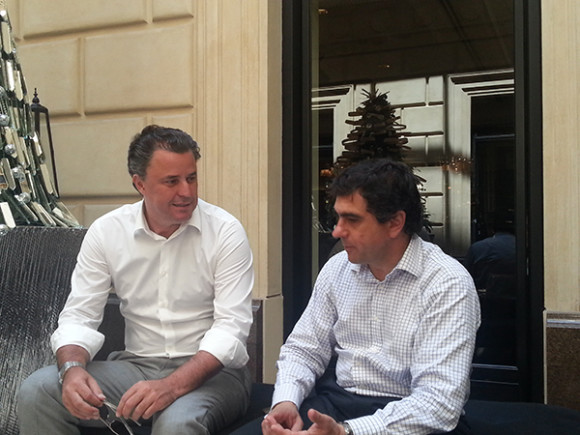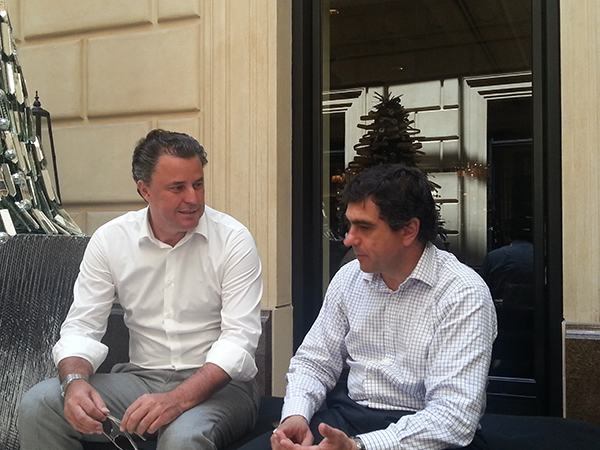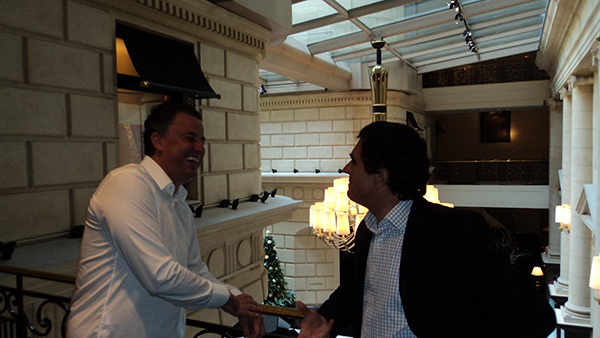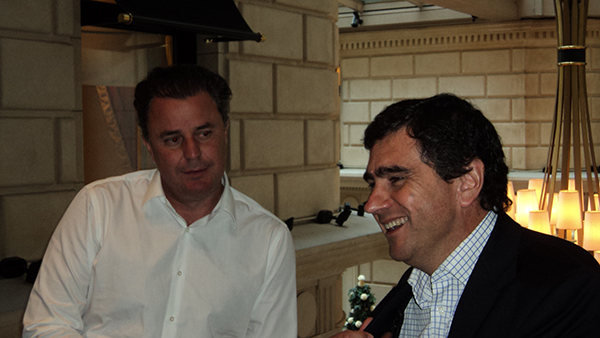We keep close communications with our customers on a day-to-day basis, identifying joint business opportunities, finding solutions to their needs, looking for ways to further integrate, among others. In addition, once in a while we like to take some time to have a good conversation with our customers to learn how their business is doing, the challenges the company and their managers are facing, and also get good tips on where to eat and places to visit in the city where they live.
In this opportunity, Alvaro Carril, Senior Vice President Sales & Marketing, caught up with Roberto Schiavone, Senior Vice President Airfreight – South & Central America at Kuehne + Nagel (KN), at the Sofitel Hotel in Buenos Aires.
ÁLVARO CARRIL (AC): 2012 was a very challenging year for the industry, much more than everyone expected. The crisis in Europe, decreased exports from China, a lower than expected growth in Brazil’s economy, continuously increasing oil prices… I could go on. In addition, LAN Airlines faced the association with TAM and added two new B777 freight to our fleet. It was a year that brought challenges of all kinds. How did KN manage these challenges?
ROBERTO SCHIAVONE (RS): 2012 definitely brought many challenges, although the Latin American market was in better shape than that of some other regions in the world, the dependency and interaction within a globalized market unavoidably affected us locally.
Although our aggressive targets were not achieved as expected, we believe that KN managed very well considering the whole global economic situation and the performance of our peers in the market. The main internal drivers to achieve such result in 2012 were a tight cost control and a strong focus on productivity increase.
AC: When planning for 2012, did you expect to face a year like this?
RS: We knew we would have a challenging year ahead of us, but not that intense. The fact is that we monitor the market trend frequently and closely. This allowed us to promptly deploy, during the first quarter of the year, the cost control and productivity initiatives I mentioned before that helped us to minimize market situation consequences.
AC: For us, the association between LAN Airlines and TAM was achieved faster than expected. It allowed LAN CARGO, among other things, to add 3 new origins in Europe (London, Paris and Milan) and an increased belly capacity out of the U.S. Unfortunately, the Brazilian market performed lower than expected, but the perishable exporting countries (Chile, Peru, Ecuador and Colombia) did very well. Now, how do you see 2013?
RS: Talking specifically about airfreight, as we all know the expectation and projections for the market next year are not too enthusiastic. We expect at least the same challenges we had in 2012. I personally don’t expect anything extraordinary happening in the market which could suddenly turn around the situation. We will enter 2013 knowing beforehand that we will have to be even more cost conscious and even more productive than we were in 2012; Moreover, we will have to focus additionally on lean management as the basis for the future. All of this in addition to a more intense and active “go to market” capillarity from our existing infra-structure, will be the only way to succeed and achieve our targets in 2013.
AC: We expect a challenging year as well, but we are well prepared to face it. The new B777 freighters allow us additional efficiency and reduced environmental impact. The integration with TAM’s cargo business, provide us with a wider network, additional capacity and an important foothold on the Brazilian domestic market. This will translate into better alternatives for our customers. Looking into 2013, which are the main challenges for KN?
RS: The European economic situation and uncertainty for the next years to come is a challenge for us as it is for everybody else.
In our region the situation and instability in markets like Venezuela and recently Argentina, which are important contributors to our results, are also elements we need to consider and monitor closely. I would also mention the relation between the pressure on profit margin reductions of today and the increase of operational expenses due to inflation in some countries in Latin America. A major challenge we had and that we are handling very well,was the integration of the huge airfreight business we recently acquired in Colombia and Ecuador in January 2011.A t the end of 2012 we are finalizing two years of integration after take over and the result is very good and satisfactory. We are very happy with what we have achieved there since then.
AC: We have a long standing and strong relationship with KN. Being one of our major Global Partners, KN is a pillar for stability and growth. In 2013, we will further look into new business opportunities and integration with KN. What is the role of LAN CARGO within KN’s 2013 strategy?
RS: I would say the role of LAN CARGO is essential for our strategy in 2013. Especially in respect to Latin America’s related traffic lanes, we consider the LATAM Airline Group as one of our major partners. This is not surprising considering the whole network, capacity and quality of service it offers in our region and other parts of the world as well. We appreciate the professionalism on how you handle our relation and the way we conduct our partnership together. We want to remain a strategic partner in 2013 and further on.
AC: Roberto, enough business talk. It has been 2 years since you took new responsibilities; in addition you moved to Buenos Aires. How has the experience been from the professional point of view?
RS: The experience has been great. It was an important step in my career inside KN and I am delighted. It is a big and complex region, with 17 countries of different sizes and profiles among themselves (i.e. Nicaragua, Cuba, Colombia, Brazil). I learn more each day when interacting with each country and the market dynamics. One of my main focuses is to assemble and reinforce a solid and consistent airfreight regional approach, not only to our customers, but also to our suppliers.
AC: What about on the personal side, how is your wife Theo and son Luigi taking the change?
RS: Well, naturally your first experience living abroad has its challenges. Due to the nature and distances within this region, also because of the acquisition we did in Colombia and Ecuador last year, I have had to travel a lot, including weekends and holidays.
My absence at home is very much felt byTheo and Luigi, who is just 6 years old, especially because they are also living in another country with a different culture. Apart from this, they are very happy, my wife quickly made friends, my son is very happy with his school, and we are well established in our house. On top, we are very close to Brazil, just a 2.5 hour flight away, which has helped us during the adaptation period.
AC: I know you enjoy good food and wine and dining out. For my next trip to Buenos Aires, what restaurant would you recommend and what should I order?
RS: I would recommend going to Rosa Negra, it is my wife’s preferred restaurant and is located in San Isidro, close to where we live. It is a relatively classy and charming place with a nice atmosphere and service.
I recommend you order the Goat Cheese Salad to start and the Bife de Chorizo as main course. Although Rosa Negra is not one of the typical Argentinean parrilla restaurants, in my opinion it is there where you can find the best Bife de Chorizo in town.
AC: It sounds great! I will definitely take your suggestions. You must miss a lot of things from Sao Paulo, but what is that you miss less?
RS: Definitely, what I miss less in Sao Paulo is the traffic, although it is fair to mention that Buenos Aires is not far away from it! Especially when I have to commute back and forth from my home to Ezeiza Airport for my frequent trips.
AC: As a Brazilian you must be a soccer team fan?
RS: Of course! I have supported Corinthians in Brazil since I was a kid. Here in Argentina I sympathize and support Club Atletico Independiente. It was an influence from a very nice Argentinean friend and working colleague here in our regional office.
AC: Before we end this nice conversation, and now that you know your way around Buenos Aires, which place would you recommend visiting?
RS: I would recommend you to visit the river around the Tigre area where you can go in a taxi boat to visit the river and have a lunch in restaurants which can only be reached by boat. It is a very nice place to visit in Buenos Aires that visitors usually don’t go to.
AC: Thank you Roberto for this interesting chat. It was great to talk about what KN experienced in 2012 and how you see 2013. I am pleased to know you and your family are doing great in your new life in Buenos Aires! My best wishes for 2013!



